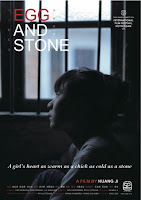Interrupting an intensely personal, deeply emotional
film about sexual abuse with some organized thuggery would be embarrassingly crass
and heavy-handed, but that is exactly what happened to Huang Ji’s film at the
Beijing Independent Film Festival. Halfway through her screening, the power to
the maverick-dissident fest was not so mysteriously cut. Inspired by her own
unfortunate experiences, Huang Ji shines a spotlight on contemporary Chinese
gender inequity in Egg and Stone (trailer here), which screens as
part of Cinema on the Edge, the retrospective tribute to the Beijing
Independent Film Festival.
Honggui was only supposed to stay with her
aunt and uncle for two years, but she has spent the last seven in their
hardscrabble Hunan village. Her aunt clearly resents her continued presence,
but her uncle is suspiciously fine with it. The fourteen year-old is indeed
pregnant, putting her in a precarious position within the judgmental society.
However, if she has a boy, it becomes a marketable commodity.
For Honggui, life is profoundly complicated by
two pernicious social dynamics, the illegal urban migration caused by extreme
rural poverty and an intractable cultural preference for boys over girls. Of
course, the Party is not eager to discuss any of this, particularly in light of
their only slightly relaxed One Child policy.
Still, Egg
is far from an overtly political film, yet it is still one of the bravest
films programmed during Cinema on the Edge. Huang Ji shot the film on location
in the same provincial town where she herself was sexually abused by her uncle.
She also has a different uncle play Honggui’s predatory guardian in Egg.
There are powerful images in Egg, but the film’s preoccupation with
menstrual blood becomes increasingly unsettling, in the wrong way. Frankly, it
distracts from the viscerally honest performance of first-time thesp Yao Honggui
as her namesake. She really looks like a barely teenaged girl who has had to
grow up quicker than she should. Yet, despite everything Yao does to pull us
into her heart and headspace, many of Huang Ji’s coldly severe stylistic
choices push us away.

